Patients commonly mistakenly believe that having cataract surgery will enable them to see perfectly without glasses and have a full range of vision. Having your cataract out and replaced with an intraocular lens should improve your vision. However, the traditional monofocal intraocular lens is a fixed focus lens. It cannot give distance focus one moment and near focus the next. Therefore, even after cataract surgery with a traditional monofocal intraocular lens, glasses will be needed to give you a full range of vision.
When you are young the natural lens in the eye works like an auto-focus on a camera. This allows us to shift our focus from far to near automatically. However, as we age and the lens hardens, the ability to shift our focus is lost (this is termed presbyopia). Usually when you are in your 40's you start to lose the ability to focus and now require bifocals or reading glasses for a full range of vision.
Traditional lens implants are monofocal (single-focus lenses), meaning they offer vision at one distance only. There are over 50 different implant powers and measurements are performed prior to your surgery to choose an implant power to usually correct your far distance vision. Unlike a glass prescription, there is no opportunity for trial and error in selecting your implant power and there is no guarantee that perfect distance focus will be achieved after your surgery. Astigmatism is another reason that distance glasses may be needed (a standard implant will not correct astigmatism). Fortunately, glasses can be used to optimize distance focus and correct any astigmatism after your cataract surgery. The goal of cataract surgery with a standard monofocal implant is to improve your vision and avoid the need for you to be dependent on thick, strong prescription glasses.
There are now available premium multifocal IOL’s and premium extended depth of focus IOL’s that have been clinically proven and FDA approved to provide both near and far vision and significantly either reduce or in some cases eliminate the need for glasses after cataract surgery. The multifocal lens implants are designed to produce a dual focus. Part of the lens is set for distance vision and part of the lens is set for near vision. The design is different from bifocal glasses where you look through the top portion for distance and bottom for near. With multifocal implants your brain 'learns' to utilize the dual simultaneous image and find the correct focus point. You adapt to the use of the multifocal implants better after it is implanted in both eyes and you have had time to adjust to them. It is not uncommon for a patient to continue to learn how to utilize the dual image and adjust for several months after the implants are placed.
The FDA approved TECNIS Symfony® extended depth of focus premium IOL works differently than the multifocal IOL to decrease or even possibly eliminate the need for glasses after cataract surgery. While the multifocal provides a dual simultaneous image the premium TECNIS Symfony® works by extending your depth of focus and thereby improving the range of vision that is clear after cataract surgery. In addition, there is a premium TECNIS Symfony® Toric implant that can address any pre-existing astigmatism that you may have.
It must be emphasized that only certain patients are good candidates for the premium implants. Patients who have undergone previous LASIK or RK or have other problems involving the cornea, retina or optic nerve are not ideal candidates for the premium implants. In addition, there are significant tradeoffs when considering any premium implant as compared to a traditional monofocal implant. The premium implant surgery is more expensive than a standard implant. Medicare and other health insurance companies will generally cover the cost of cataract surgery with a traditional monofocal implant. However, the additional expense of the premium implant and required additional procedures are NOT covered by your insurance. It must be remembered the purpose of the premium implant is to reduce your dependence on glasses and are not 'medically necessary' because they have nothing to do with improving the health of your eye. Other tradeoffs include the possibility of significant halos and glare at night. The frequency and severity of this problem is dependent on many factors (pupil size, type of implant utilized, etc.) but cannot always be predicted pre-operatively. It must be emphasized that the premium implants are designed to decrease your dependence on glasses but may not eliminate the need for glasses for some visual tasks.
My goal is to offer all of my patient's a complete range of implant options with state-of-the-art microincision cataract surgery in a cost-effective and compassionate manner. The implant decision must be individualized and tailored to your specific visual needs. It must be emphasized that after a thorough eye examination it may be determined that you are not a good candidate for a particular implant. After your evaluation I will discuss with you what I think are your best implant options and what is the best course of action individualized to your particular situation.
The premium TECNIS Symfony® Implant is the first and only FDA approved extended depth of focus implant that takes advantage of new optical technology to decrease your dependence on glasses after cataract surgery. For patients with pre-existing astigmatism, there is a TECNIS Symfony® Toric implant as well. Clinical studies have proven that that new Symfony® extended depth of focus optical technology provides better uncorrected intermediate and near vision without glasses compared to a standard monofocal implant. Dr. Ullman was the first surgeon to implant the TECNIS Symfony® Implant in the Florida Panhandle.
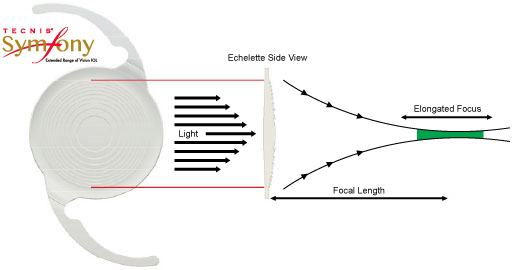
More information regarding the TECNIS Symfony® Implant or the TECNIS Symfony® Toric Implant can be obtained at the company’s web site at www.tecnisiol.com/us/patient.
The Tecnis® Multifocal IOL features a fully diffractive posterior surface designed to give patients back their youthful vision. Studies reveal the Tecnis® Multifocal IOL provides patients with high quality vision at distance and near, and in any light condition – even in low light.
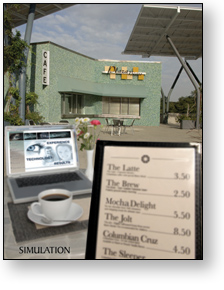
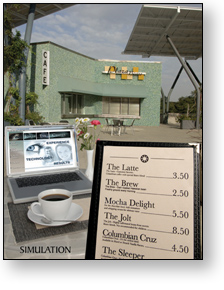
Dr. Ullman was the first surgeon to implant the Tecnis® Multifocal IOL in the Pensacola region and has extensive experience with implantation of multifocal IOL’s. Above is a simulation of post-op vision with a traditional monofocal implant and with the Tecnis® Multifocal Implant. Nearly 9 out of 10 study patients implanted with the Tecnis® Multifocal IOL in both eyes did not require glasses.
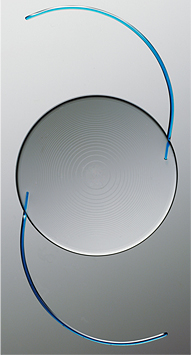
Please carefully read the section entitled Multifocal Lens Implants which reviews pertinent information regarding the multifocal implant technology. More information regarding the Tecnis® Multifocal IOL can be obtained at the company’s web page at: Tecnismultifocal.com
ReSTOR® Aspheric Implant has a uniquely shaped optic, called "apodization" that is new to the field of implants. Apodization is the gradual tapering of the steps of the implant from the center to the outside edge of the lens. These steps result in an increased range of quality of vision as compared to a monofocal implant. A similar technology has been used for years in microscopes and telescopes to improve image quality. The central aspect of this implant is for near vision and the periphery is dedicated to distance vision. This implant excels in distance and close vision (approximately 12 inches) but objects at intermediate distance may still be somewhat out of focus.
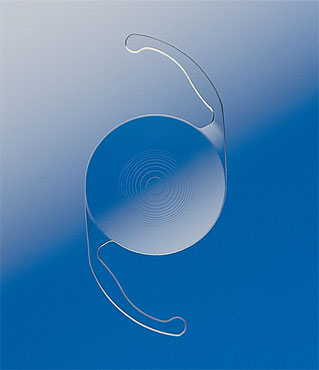
Please carefully read the section entitled Multifocal Lens Implants which reviews pertinent information regarding the multifocal implant technology. More information regarding the ReSTOR® Multifocal Implant can be obtained at the company's web page at AcrySofReSTOR.com.
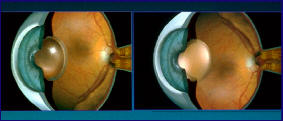
Most cataracts develop slowly over a period of time. A cataract can take months or years to reach a point where it adversely affects your vision. Most cataracts occur as part of the normal aging process and if you live long enough you can expect to develop a cataract (along with gray hair and wrinkles). Cataracts are more common in certain diseases, such as diabetes or patients with a history of smoking abuse and in patients that take certain medications chronically (such as corticosteroids).
The Tecnis Toric Intraocular Lens (IOL) is a recently FDA approved IOL that can be implanted at the time of your cataract surgery to replace your clouded lens. The unique design of the Tecnis Toric makes it possible to reduce or eliminate corneal astigmatism and significantly improve your uncorrected distance vision. This IOL is fixed focus and most patients will still need reading glasses at a minimum after surgery. It must be emphasized that Dr. Ullman cannot guarantee you that your astigmatism will be eliminated. In FDA studies however, 97% of patients that had the Tecnis Toric IOL implanted bilaterally achieved spectacle freedom for distance vision after their surgery.

The Tecnis Toric IOL is custom ordered to correct your astigmatism as well as replace the function of your natural lens. Dr. Ullman utilizes special pre-operative tests and a computer program to determine the exact IOL that would be best for you. The Toric IOL is considered a premium IOL and the expense of this IOL and additional procedure is NOT covered by your insurance. Prior to your procedure the office staff will review with you exactly what your additional out of pocket expense would be if you decide to have your astigmatism surgically addressed. If you have a very large amount of astigmatism it may be necessary to utilize the Toric IOL combined with limbal relaxing incisions at the time of your surgery to give you the best post-operative results.
The TECNIS Symfony® Toric Implant is potentially an option for those patients with pre-existing astigmatism that also want to decrease their dependence on glasses for near and intermediate visual tasks. This implant utilizes the same technology as the Tecnis Toric IOL to correct your astigmatism but also takes advantage of new optical properties that extend your range of focus and therefore decrease your dependence on glasses for near or intermediate visual tasks.
Dr. Ullman and his staff are committed to offering all of his patients a complete range of options and to provide state-of-the-art microincision cataract surgery in a cost-effective and compassionate manner. Which IOL and procedure to utilize is an individualized decision and it is important that you be as informed as possible. Certainly there can be no guarantee’s regarding results but Dr. Ullman and his staff will do everything possible to make your microincision cataract surgery successful.